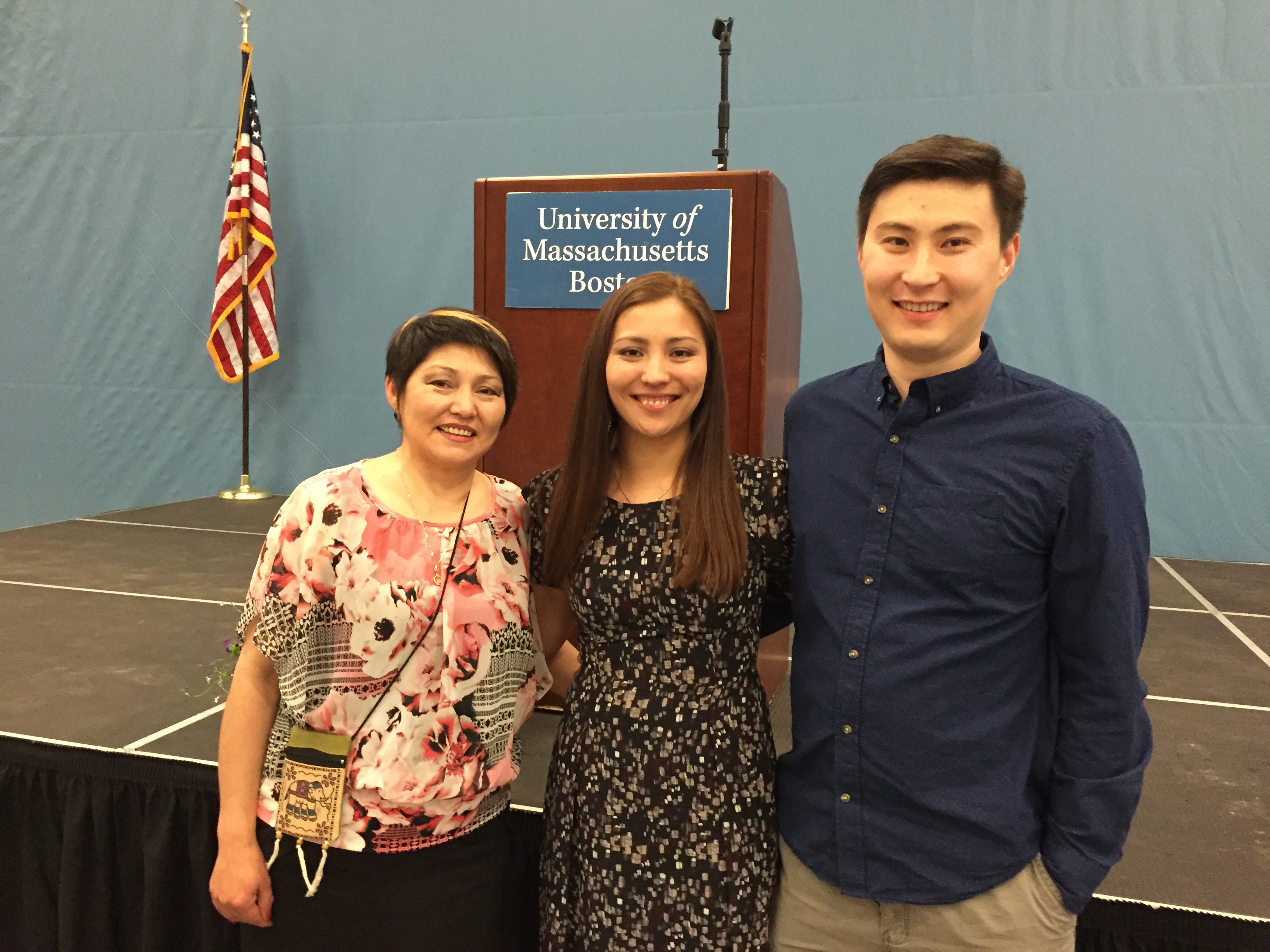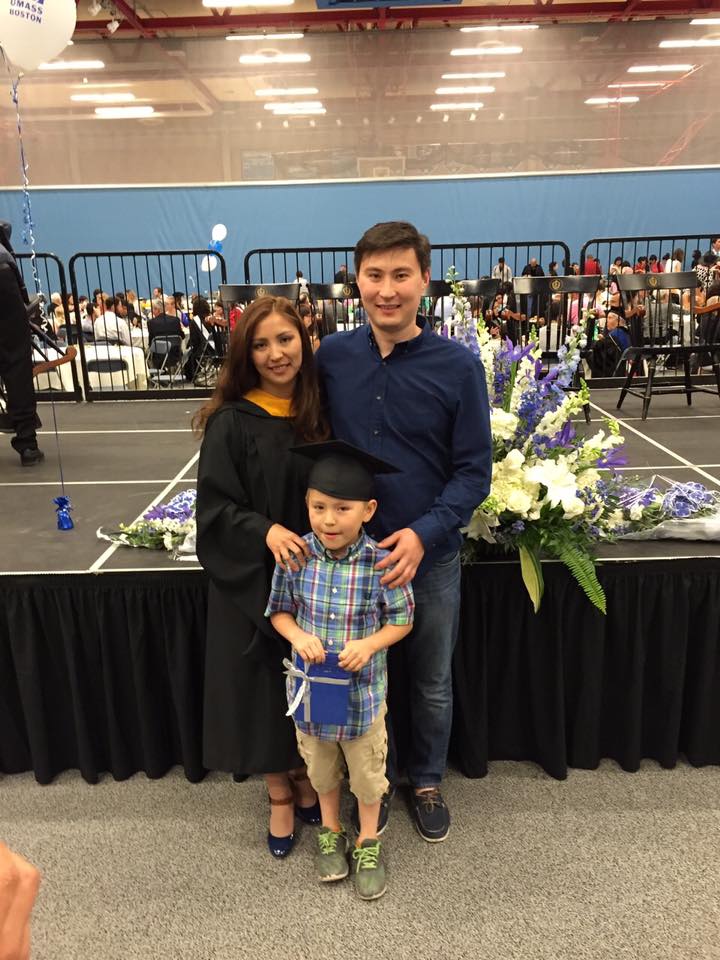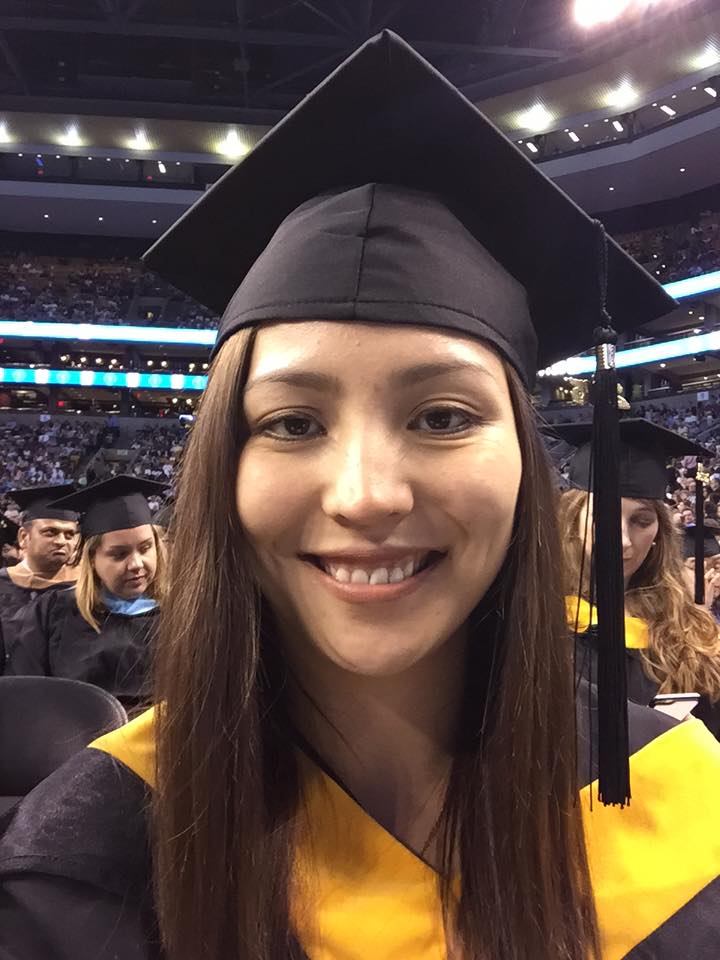June 22, 2015
AUCA Psychology Department's alumna, Eleonnora Turdubaeva, has won the Best Student in Mental Health Counseling Award as she graduated from a Master's Program at the University of Massachusetts in Boston, USA. Eleonnora told us about her studies in the US, her life philosophy, and all the challenges she has faced aiming towards her dream.

Please tell a little bit about yourself.
I was born in Kara-Suu village, in Southern Kyrgyzstan, and was raised in the city of Osh. I went to Lomosov high school in Osh where I was involved in various social and recreational activities. Thanks to my mother, I started ballroom dancing when I was eight. I loved dancing very much. I also attended a music school during seven years and played piano. All these activities fostered a versatile personality and I am grateful for that to my parents.
My high school gave me good foundations of general knowledge. I always was a diligent student and English language was my favorite class. In 2004, I graduated from high school and won the President Diploma for high results in national testing, so I could technically enter any university I liked. AUCA was not my first choice. I first thought of applying to the Kyrgyz-Russian Slavic University to study international comparative politics because it was very popular at the time. Psychology was only my second choice. When I came to Bishkek to apply to local colleges, I heard about AUCA and decided to take my chances there. I was not sure I could get in and I did not know about the possibilities to get financial aid, so I did not really think of it as a credible choice. But I wanted to test my English skills and see the results. I had good TOEFL results and passed the entrance exams of psychology department. I still was not sure about the costs, and it is only after I received 50% financial assistance that I picked up AUCA.
What did you like the most in AUCA?
From day one I fell in love with the atmosphere and the friendly staff of the school. I never regretted my decision. My AUCA’s years were the best of my life. Warm, passionate professors, friendly students and family-like relationships made me feel like home. All professors of the psychology department influenced my growth in a way or another. I loved the classes of Dr. Aaron Abramovich Brudny and Dr. Elena Molchanova because they were 100% involved with their students, and their lectures were very interesting.
During my AUCA student’s life, I was involved in different extracurricular activities - life would be so boring without these. Unfortunately, I could not continue my ballroom dancing because of intense studying. Also, I got involved in the drama theatre «Debut» and Nikolai Grigorevich Shulgin was the best instructor, teacher and mentor. We participated in many events, and even performed several concerts in Issyk-Kul, Osh and Batken. I was also volunteering in the Alumni Association. We organized fundraising and charity events with all volunteers. I remember going to orphanages for New Year parties. I loved that I was able to be a part of all of these activities.
I made wonderful lifetime friends during those years. I even met my love - Meder Toktosunov (alumna 2006), who is my husband now.
I think the most important thing that AUCA does for its students is that it allows them to discover their talents and use them in a productive way. It lets student become the person that he/she wants to be. That is an invaluable gift to students because in our culture, the youth is told what to do and many young talented individuals follow the path that they did not choose because they are pushed by parents, relatives, friends or others.
What difficulties have you faced during your study at AUCA?
The most difficult part of my AUCA life was, of course, studying, especially the first year. It was quite challenging because I was getting adjusted to the American education system. I often had to study until 3 am to finish my homework. Yet, I can say that all these sleepless nights paid off very well.
Why you chose psychology among all the other majors?
Because I wanted to help people. If you ask any psychologist, social worker, psychiatrist or even any other doctor, you will probably hear the same answer. They choose these types of professions because they want to help. And this is not a cliché, this is the true. The need to change something in the community and help people live healthier lives led me to the mental health field.
I wanted to serve my community in a way that would guide individuals to become who they want to be, to help them grow personally and help them experience life in a joyful way. Life does not have to be so difficult, and my job is to help them realizing it. I was fascinated by the world of psychology and found my passion in counseling. I learned exactly how I could serve others while studying at AUCA and now I feel lucky being able to make a living with my passion.

Please tell us about your path to the Master’s degree. What challenges and difficulties have you faced while entering the University of Massachusetts in Boston?
This path was the most difficult of all. After I graduated from AUCA, I took a three-year break from school. I got married, had a child, and started to work in human resources. Although HR was a challenging and attractive field, I always knew that I had a zeal for counseling and needed to get back to mental health field. In 2009, my husband was a Muskie fellowship winner and we moved to Spokane, WA, USA, where he attended a graduate school until 2011. At that point, I was a stay-home mom of a two-year old child. I started to think about graduate school. I did a lot of research about different schools and scholarship programs, but it became obvious that in this field I could not get a full scholarship. It was just impossible. This thought was bothering me a lot since I could not finance my studies.
When I was a senior in AUCA, my thesis work was evaluated by Dr. Sharon Horne, Professor of Counseling Psychology, who has been an Open Society Foundations Academic Fellow with the psychology department. I was overwhelmed and did not know where to apply and how to pay for my studies, so I contacted Dr. Sharon Horne. She advised me to apply to the University of Massachusetts in Boston. Dr. Horne has been my mentor and the most inspiring woman to me since then. I learned about school and about various opportunities to get a scholarship. I applied only to UMass because applications were expensive and I did not have a budget for applying to various schools. Luckily, I got in fairly easy because I had high TOEFL scores and a solid application due to the research that I had done for my thesis project. The GRE scores were not great but the commission often looks at different personal factors, not only scores.
Additionally, I received the research assistantship position in the department that gave me 75% tuition discount. That position consisted of working in a research team and assisting with various research activities. That is how I ended up studying in UMass Boston.
How the studies there differ from the studies at AUCA?
Studying in a graduate school is completely different from undergraduate. It is much more complex, and all professors assume that you have more than 24 hours in a day. For example, one assignment could consist of reading the whole book and writing a review about it in a week. I was constantly reading and writing papers, researching articles etc. It was insane. Sometimes, I did not have time to go to the bathroom because there was a deadline for a certain assignment or paper.
Needless to say that I barely slept the first semester. I was high on caffeine and energy drinks. So the most challenging task for me was to balance graduate school with life, family and other responsibilities. I am very grateful for the support I got from my husband, my son, my friends and the rest of my family. It is truly hard to accomplish something like that without support. Even though it is challenging, at the same time it is much more deeper than just studying. I grew as a person. I have changed and became wiser throughout the process. Although it was tough to study in a American college, AUCA gave me a solid base of knowledge. When I started in UMass Boston, I felt very secure and competent, and often thanked AUCA for that.
You won the Best Student in Mental Health Counseling Award at your university. What project or paper work did you present for this award?
Honestly, this was completely unexpected for me. I did not present any work for that. I was nominated by the Department, and then all the faculty chose me. I was notified about that two weeks before graduation. The selection criteria were academic excellence, professional contribution to the Mental Health Department as a Research Assistant, and personal qualities. I did study hard and my GPA was 4.0 three semesters in a row, giving a total of 3.98 GPA at the end.
I was honored during the convocation ceremony. It was held before the graduation ceremony, and all the best students from various departments were honored by special gifts during this event. This experience was incredible. My hard work was acknowledged and every struggle paid off.

What about your future plans? Are going to come back to Bishkek or stay in the US?
I was offered a job to work as a clinician (counselor) in a local mental health agency right before my graduation. As an international student, I have an opportunity to do the optional practical training for a year, and I accepted this offer. It is a good way for me to get practical experience before going back to Kyrgyzstan. I know that if I go back, I need to be prepared on all levels, especially in my field it is very important to practice, not just learn theory. So my plans are to learn, learn and learn in the US while I am here and then to implement my knowledge in Kyrgyzstan. My long-term plan is to open a clinical practice in Kyrgyzstan.
Any advice to the current AUCA students and graduates?
To students, I want to wish perseverance, self-confidence and to find a passion. The most important is to believe in yourself no matter what challenges you’ll encounter. Never listen to others, just listen to yourself and be true to your inner guidance. Find what you love doing, find your passion and make it your profession.
I love to ask that one question when people come to me for a vocational advice: “If there were no barriers at all and you were given an absolute freedom to choose anything you want, what would you choose to do in life?” The answer to this question is a guide to your passion. If you do what you love, it will ultimately lead to success.